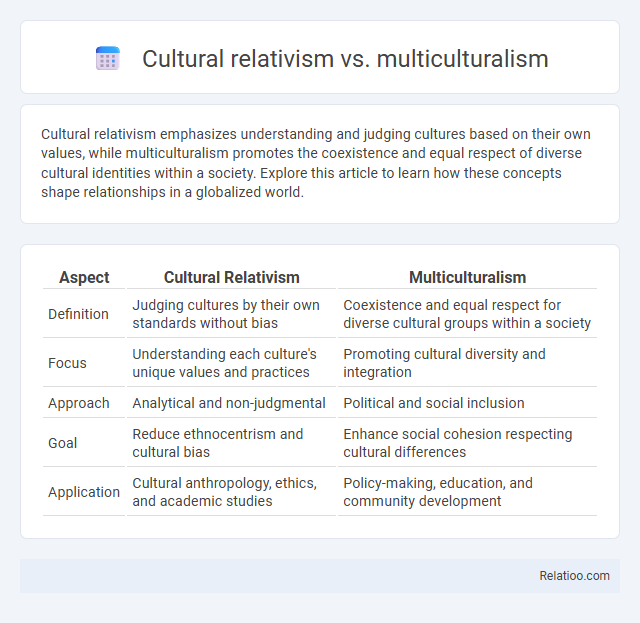Cultural relativism emphasizes understanding and judging cultures based on their own values, while multiculturalism promotes the coexistence and equal respect of diverse cultural identities within a society. Explore this article to learn how these concepts shape relationships in a globalized world.
Table of Comparison
| Aspect | Cultural Relativism | Multiculturalism |
|---|---|---|
| Definition | Judging cultures by their own standards without bias | Coexistence and equal respect for diverse cultural groups within a society |
| Focus | Understanding each culture's unique values and practices | Promoting cultural diversity and integration |
| Approach | Analytical and non-judgmental | Political and social inclusion |
| Goal | Reduce ethnocentrism and cultural bias | Enhance social cohesion respecting cultural differences |
| Application | Cultural anthropology, ethics, and academic studies | Policy-making, education, and community development |
Defining Cultural Relativism
Cultural relativism defines the principle that an individual's beliefs and practices should be understood based on that person's own culture, without judgment from external standards. This concept emphasizes the importance of context in evaluating cultural norms, promoting tolerance and preventing ethnocentric bias. You can apply cultural relativism to appreciate diverse worldviews while recognizing the complexity of evaluating moral and social practices across different societies.
Understanding Multiculturalism
Multiculturalism promotes the coexistence and appreciation of diverse cultural identities within a society, fostering inclusion and mutual respect. Unlike cultural relativism, which emphasizes understanding and evaluating beliefs or practices within their own cultural context without judgment, multiculturalism actively encourages interaction and integration among different cultures. Your ability to embrace multiculturalism enhances social cohesion and broadens perspectives by valuing cultural diversity rather than merely tolerating differences.
Historical Contexts of Both Concepts
Cultural relativism, rooted in early 20th-century anthropology, emphasizes understanding cultures on their own terms, challenging ethnocentrism during colonial and post-colonial eras. Multiculturalism emerged in the mid-to-late 20th century, especially in Western democracies, as a political and social policy promoting coexistence and equal respect for diverse cultural groups amid increasing immigration and civil rights movements. Historical contexts reveal cultural relativism as an academic and ethical framework, while multiculturalism functions as a societal approach addressing real-world diversity and integration challenges.
Key Philosophical Foundations
Cultural relativism is grounded in the philosophy that moral values and practices are relative to cultural contexts, emphasizing understanding cultures on their own terms without imposing external judgments. Multiculturalism promotes the coexistence and mutual respect of diverse cultural identities within a society, rooted in political philosophy advocating equal recognition and inclusion. Your awareness of these key philosophical foundations helps navigate ethical dilemmas by balancing respect for cultural diversity with universal human rights principles.
Cultural Relativism in Modern Society
Cultural relativism emphasizes understanding and evaluating cultural practices within their own societal contexts, promoting tolerance and reducing ethnocentric judgments in diverse modern societies. It challenges you to suspend personal biases and appreciate cultural differences without imposing external standards, fostering peaceful coexistence amid globalization. In contrast, multiculturalism actively supports the coexistence of diverse cultural groups, while cultural relativism provides the philosophical foundation for respecting cultural diversity in social policies and intercultural interactions.
Multiculturalism and Social Integration
Multiculturalism promotes the coexistence of diverse cultural groups within a society, emphasizing the preservation of distinct cultural identities while fostering mutual respect. Social integration in multicultural contexts involves creating inclusive policies and practices that encourage interaction and equal participation among different cultural communities, reducing social barriers and discrimination. Unlike cultural relativism, which prioritizes understanding cultures on their own terms without judgment, multiculturalism actively seeks to balance cultural diversity with social cohesion and national unity.
Points of Convergence and Divergence
Cultural relativism emphasizes understanding cultural practices within their own contexts without judgment, while multiculturalism promotes coexistence and appreciation of diverse cultures within a society. Both advocate for cultural respect and oppose ethnocentrism, but divergence arises as cultural relativism refrains from imposing external values, whereas multiculturalism actively encourages cultural exchange and integration. Your approach to these concepts shapes how you navigate cultural diversity, balancing respect for differences with societal cohesion.
Impacts on Policy and Governance
Cultural relativism emphasizes understanding customs and beliefs within their own cultural context, challenging universal policies by promoting respect for cultural diversity in governance frameworks. Multiculturalism actively incorporates multiple cultural identities into policy development, fostering inclusion and equal representation in public institutions and legislation. Your approach to policy must balance these perspectives to create governance that respects cultural differences while ensuring social cohesion and equitable rights.
Ethical Debates and Controversies
Ethical debates around cultural relativism center on whether moral standards should be universally applied or understood within cultural contexts, raising controversies about practices like human rights violations and gender discrimination. Multiculturalism promotes coexistence and respect for diverse cultures while sometimes conflicting with universal ethical principles, challenging Your ability to navigate cultural sensitivity without endorsing harmful customs. These debates highlight the tension between respecting cultural diversity and upholding ethical norms, requiring careful consideration in global ethical discussions.
Future Prospects and Global Trends
Future prospects of cultural relativism emphasize understanding diverse moral frameworks within global ethics, while multiculturalism promotes coexistence and policy inclusion of multiple cultural groups, shaping inclusive governance models. Emerging global trends highlight increased digital interconnectedness, encouraging cross-cultural dialogue, and challenging ethnocentric perspectives, which demands that your approach adapts to both cultural relativism's respect for cultural norms and multiculturalism's integration goals. The evolving balance between respecting cultural differences and fostering unified societies remains critical as globalization advances, influencing international cooperation and social policy development.

Infographic: Cultural relativism vs Multiculturalism
 relatioo.com
relatioo.com